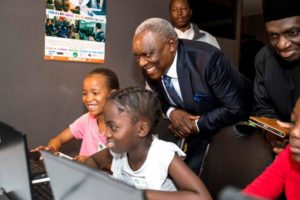
Johannesburg, South Africa, October 8, 2018//-The fourth edition of the increasingly popular Africa Code Week, an initiative of SAP, kicked-off today at a function held in Johannesburg.
Since its inception in 2015, Africa Code Week has introduced over 1.8 million African youth to coding skills in multiple African countries while facilitating the integration of ICT education in the school curriculum for more than 28,000 teachers and educators across the continent.
The programme will occur during October with set dates for countries to accommodate the school calendar, Africa Code Week aims to engage an additional 600 000 youth across 36 African countries in 2018.
South African Minister of Telecommunications & Postal Services, Dr Siyabonga Cwele, welcomed this year’s initiative and called on public and private sector stakeholders to join forces and drive the advancement of digital skills development among youth: “Content is going to be a key game changer for us as a continent in the Fourth Industrial Revolution.
Initiatives such as the Africa Code Week are helping us to develop the local content which will drive demand for internet services.
Crucially, we are going to rely on partnerships with the private sector and other social partners to develop the digital skills the continent needs to be competitive in the Fourth Industrial Revolution. We also need to introduce coding to learners at an early stage.”
Digital skills and girl empowerment to drive the continent’s development
According to Cathy Smith, Managing Director of SAP Africa, the Fourth Industrial Revolution is forcing a complete rethink of how education is approached, with a strong focus on lifelong skills development.
“Africa Code Week is our response: by inspiring a new generation of African youth through digital skills development, and by empowering teachers and communities with digital teaching tools, we aim to accelerate digital literacy while ensuring a more inclusive and innovation-led workforce.
As the African workforce swells by 112 million people over the next two years, initiatives such as Africa Code Week will be instrumental in ensuring that our youth can be active participants in the global digital economy.”
World Bank data shows that sub-Saharan Africa’s economy is expected to continue its steady recovery with economic growth estimated at 3.6% in 2019-20.
However, 40 million young people are currently unemployed, with millions more trapped in poverty. In fact, nearly 35% of Africa’s youth lack the basic skills they need to perform a job, with technology skills an area of concern: a pressing challenge that requires strong private, public and non-profit partnerships to drive sustainable learning impact across the continent.
Placing an equally sharp focus on the gender divide in developing countries, Africa Code Week key partners SAP, UNESCO YouthMobile and the German Federal Ministry for Economic Cooperation and Development (BMZ) joined forces in 2017 as part of the G20 #eSkills4girls initiative.
“For Africa to take its rightful place as a key player in the global economy, we must collectively drive digital skills development while placing a strong emphasis on encouraging female participation in an effort to bridge the gender gap.
Female participation in last year’s Africa Code Week stood at 46.5%, indicating huge strides towards empowering girls in the digital century and fostering gender equality in African ICT education,” Smith continues.
Building sustainable community capacity
The 2018 edition of Africa Code Week launched on UNESCO’s World Teachers’ Day, established in the 1990s to promote teachers’ status in the interest of quality education.
The initiative forms part of SAP’s global commitment to achieving the United Nations Sustainable Development Goals, specifically Goals 4 (Quality Education) and 5 (Gender Equality). At the launch ceremony, Africa Code Week gave thanks to its most important participant by rewarding a community teacher who had made a significant impact to the programme.
The prize includes a fully paid trip to the SAP showcase, SAPPHIRENOW, in Orlando, United States of America during May 2019.
On a mission to empower 70 000 teachers and positively impact the lives of 2 million young Africans by 2020, Africa Code Week is supporting governments’ sustainable capacity building strategies.
Every year between June and September, SAP funds a series of Train-the-Trainer (TTT) sessions to empower teachers with skills and teaching materials that drive the advance of digital skills in the school curriculum.
As part of this year’s TTTs organized across 20 countries in the build-up to the 2018 edition, 500 teachers were trained in Ghana, 1,200 in Nigeria, 200 in Madagascar, and another 1,000 in Botswana.
For the third year in a row, Google is also supporting Africa Code Week as part of its own commitment to preparing 10 million people in Africa for tomorrow’s workplace.
In 2018, Google is supporting 53 non-profit organisations across 11 countries to empower teachers and inspire an estimated 80 000 students through computer science and coding workshops.
African Eye Report


